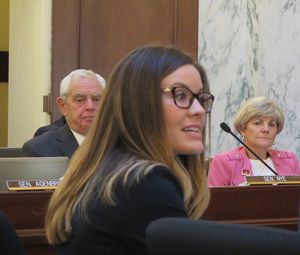Idaho Office of Drug Policy reports some success with prevention; next target is opioid abuse
Nicole Fitzgerald, administrator of Idaho’s Office of Drug Policy, told JFAC this morning that substance-abuse prevention efforts in Idaho are having impact. According to the annual youth behavior risk survey, she said, the percentage of Idaho youth who reported drinking alcohol has dropped from 42.5 percent in 2007 to just 26.5 percent in 2017. Those reporting having used marijuana in the past 30 days has dropped slightly from 17.9 percent to 16.7 percent in 2017.
In national statistics, she said, “Idaho ranked 33rd among the states … for the number of individuals 12 years and older reporting illicit drug use in the past month. … The top 20 states have legal retail or medical marijuana.”
“Idaho has been successful thus far in our … prevention work, and we’re very proud of the work that we do in conjunction with our prevention partners,” Fitzgerald told legislative budget writers.
The office largely functions on federal grant funds for its programs; state funding largely pays for its staff of six. A major effort in the past year, Fitzgerald said, was the developing of a strategic plan to address the opioid crisis in Idaho. “According to the most recent national survey, Idaho ranks 5th nationally for prescription pain reliever misuse for individuals 12 and older,” she said. The office convened a two-day multi-sector retreat last April to develop the strategic plan; it takes a four-pronged approach, including education; improving prescription practices; strengthening and supporting families; and expanding awareness of and access to treatment.
“Our work group is working tirelessly to achieve our vision of achieving a state of Idaho that is free of opioid abuse and opioid misuse disorder by 2022,” Fitzgerald said.
Sen. Mary Souza, R-Coeur d’Alene, said she served on that work group, and is excited about prospects for results. “I wonder if you can tell us, even though it hasn’t even been a year yet since the work group met and policies started to be implement,” has there been “any slowing of the opioid increase or possibly any effect of our efforts in Idaho to get this under control?”
Fitzgerald said not yet. “We finalized the strategic plan at the end of September,” she said. “We feel like we were already up and running really at a very quick clip to implement strategies. In terms of the data, we haven’t seen a slowing or any change in trend as a result of those activities, but we are hoping that next year we can come and point to some performance measures.”
Souza responded, “I heard from Board of Pharmacy that we in Idaho have seen a decrease of just over 2 percent … reducing the use of opioids.” That, she said, “is pretty remarkable ... but maybe we’ll wait and see if all the numbers come in to confirm that.”
The Office of Drug Policy was created during the 2007 legislative session. It handles some substance abuse prevention efforts that are part of grants received by the state Department of Health & Welfare. This year, it also received a grant from the state Millennium Fund for programs through pharmacies to encourage Idahoans to dispose of unused prescription drugs; and a grant to distribute more than 3,000 doses of Naloxone, a drug that counteracts opoid overdoses, to providers across the state.

